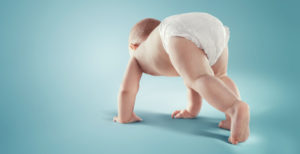Some sorely needed advice about diaper rash and diaper changes
 Babies wear diapers for the first two to three years of their lives. Most of them will have at least one diaper rash during that time. Usually, wet or dirty diapers irritate the skin, but infections and allergies can also cause irritation that’s known as diaper dermatitis. Our Plano pediatricians have tips for parents to help them treat and prevent sore bottoms.
Babies wear diapers for the first two to three years of their lives. Most of them will have at least one diaper rash during that time. Usually, wet or dirty diapers irritate the skin, but infections and allergies can also cause irritation that’s known as diaper dermatitis. Our Plano pediatricians have tips for parents to help them treat and prevent sore bottoms.
Symptoms and signs of diaper rash
When babies have a rash, they often get fussy and cry during diaper changes. Usually, wet or dirty diapers against the skin cause irritation. This rash makes the skin red, sore and bumpy. In some cases, the skin on the buttocks peels or becomes scaly.
Skin infections that involve bacteria or fungi can cause symptoms, such as soreness and red bumps. However, infections can also cause more severe signs, such as blisters, open sores or fluid seepage. Babies who have blisters or sores should see our Plano pediatricians as soon as possible.
Some babies simply have sensitive skin, so the ingredients in baby wipes, soaps, detergents and even some diapers can cause skin problems. If a diaper rash persists after treatment, the baby should visit a physician to determine whether allergies are causing the problem.
Treating and preventing this type of skin irritation in babies
As soon as parents notice irritation, it’s time to treat the baby’s rash.
- Change diapers often, about every two hours, to avoid exposure to waste.
- During changes, avoid baby wipes. Instead, use warm water and a soft cloth.
- Thickly apply ointment or cream that contains zinc oxide with every diaper change.
- Let the baby go without diapers when possible to help the skin breathe and dry.
The best way to prevent diaper rash is to change diapers frequently as well as clean and dry the bottom thoroughly after each change. Here are some other tips.
- Allow the bottom to dry completely before putting on a new diaper.
- Dry the skin by gently patting (not rubbing) it with a soft cloth.
- Don’t put the diaper on too tightly or chafing may occur.
When a rash doesn’t clear up within a few days of home treatment or the rash is severe, contact our Plano pediatricians for medical care.

